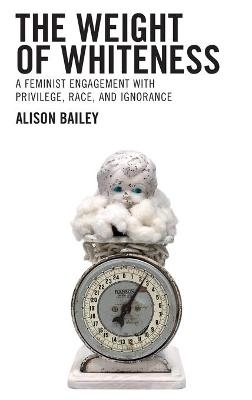
The Weight of Whiteness
A Feminist Engagement with Privilege, Race, and Ignorance
Seiten
2021
Lexington Books (Verlag)
978-1-7936-0449-1 (ISBN)
Lexington Books (Verlag)
978-1-7936-0449-1 (ISBN)
The Weight of Whiteness invites white people to wade mindfully into the inherited epistemic and affective weight of whiteness. It examines the ways that white supremacy and privilege continue to anesthetize white people from the inherited damage that whiteness does to our collective humanity.
“Check your privilege” is not a request for a simple favor. It asks white people to consider the painful dimensions of what they have been socialized to ignore. Alison Bailey’s The Weight of Whiteness: A Feminist Engagement with Privilege, Race, and Ignorance examines how whiteness misshapes our humanity, measuring the weight of whiteness in terms of its costs and losses to collective humanity. People of color feel the weight of whiteness daily. The resistant habits of whiteness and its attendant privileges, however, make it difficult for white people to feel the damage. White people are more comfortable thinking about white supremacy in terms of what privilege does for them, rather than feeling what it does to them. The first half of the book focuses on the overexposed side of white privilege, the side that works to make the invisible and intangible structures of power more visible and tangible. Bailey discusses the importance of understanding privileges intersectionally, the ignorance-preserving habits of “white talk,” and how privilege and ignorance circulate in educational settings. The second part invites white readers to explore the underexposed side of white dominance, the weightless side that they would rather not feel. The final chapters are powerfully autobiographical. Bailey engages readers with a deeply personal account of what it means to hold space with the painful weight of whiteness in her own life. She also offers a moving account of medicinal genealogies, which helps to engage the weight she inherits from her settler colonial ancestors. The book illustrates how the gravitational pull of white ignorance and comfort are stronger than the clean pain required for collective liberation. The stakes are high: Failure to hold the weight of whiteness ensures that white people will continue to blow the weight of historical trauma through communities of color.
“Check your privilege” is not a request for a simple favor. It asks white people to consider the painful dimensions of what they have been socialized to ignore. Alison Bailey’s The Weight of Whiteness: A Feminist Engagement with Privilege, Race, and Ignorance examines how whiteness misshapes our humanity, measuring the weight of whiteness in terms of its costs and losses to collective humanity. People of color feel the weight of whiteness daily. The resistant habits of whiteness and its attendant privileges, however, make it difficult for white people to feel the damage. White people are more comfortable thinking about white supremacy in terms of what privilege does for them, rather than feeling what it does to them. The first half of the book focuses on the overexposed side of white privilege, the side that works to make the invisible and intangible structures of power more visible and tangible. Bailey discusses the importance of understanding privileges intersectionally, the ignorance-preserving habits of “white talk,” and how privilege and ignorance circulate in educational settings. The second part invites white readers to explore the underexposed side of white dominance, the weightless side that they would rather not feel. The final chapters are powerfully autobiographical. Bailey engages readers with a deeply personal account of what it means to hold space with the painful weight of whiteness in her own life. She also offers a moving account of medicinal genealogies, which helps to engage the weight she inherits from her settler colonial ancestors. The book illustrates how the gravitational pull of white ignorance and comfort are stronger than the clean pain required for collective liberation. The stakes are high: Failure to hold the weight of whiteness ensures that white people will continue to blow the weight of historical trauma through communities of color.
Alison Bailey is professor of philosophy at Illinois State University, where she directs the Women's, Gender, and Sexuality Studies Program.
Acknowledgments
Introduction: Has The Weight Finally Come Up to Claim Us?
1. Understanding Privilege as Unearned Power Conferred Systemically
2. The Problem with White Talk: Ignorance and Epistemic Closure
3. Tracking Privilege-Preserving Epistemic Pushback in Feminist Philosophy and Critical Race Theory Classes
4. The Weighty Conversation: How White Supremacy Damages White People
5. Inheriting the Weight of Whiteness
Bibliography
| Erscheinungsdatum | 10.05.2021 |
|---|---|
| Reihe/Serie | Philosophy of Race |
| Verlagsort | Lanham, MD |
| Sprache | englisch |
| Maße | 161 x 230 mm |
| Gewicht | 490 g |
| Themenwelt | Geisteswissenschaften ► Philosophie ► Erkenntnistheorie / Wissenschaftstheorie |
| Sozialwissenschaften ► Politik / Verwaltung ► Politische Theorie | |
| Sozialwissenschaften ► Soziologie | |
| ISBN-10 | 1-7936-0449-5 / 1793604495 |
| ISBN-13 | 978-1-7936-0449-1 / 9781793604491 |
| Zustand | Neuware |
| Haben Sie eine Frage zum Produkt? |
Mehr entdecken
aus dem Bereich
aus dem Bereich
die Grundlegung der modernen Philosophie
Buch | Softcover (2023)
C.H.Beck (Verlag)
CHF 25,20
Buch | Softcover (2023)
Reclam, Philipp (Verlag)
CHF 9,80


![Was heißt Denken?. Vorlesung Wintersemester 1951/52. [Was bedeutet das alles?] - Martin Heidegger](/media/113619842)